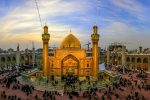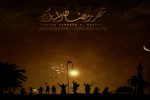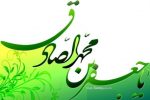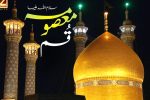Imam al-Hadi’s Answers to Yahya bin Aktham’s Questions
Musa bin Mohammed bin Ali Ar-Reza related:I met Yahya bin Aktham in a public meeting and he asked me a number of questions.I then came to my brother Ali bin Mohammed (peace be upon him) who addressed to me several admonitions that made me accede to the obedience to him. Afterwards, I said to him, […]

Musa bin Mohammed bin Ali Ar-Reza related:
I met Yahya bin Aktham in a public meeting and he asked me a number of questions.
I then came to my brother Ali bin Mohammed (peace be upon him) who addressed to me several admonitions that made me accede to the obedience to him. Afterwards, I said to him, “God make me your sacrifice. Son of Aktham asked me various questions and sought their answers.” The Imam (peace be upon him) laughed and asked whether I could answer him or not. “No,” answered I, “I could not answer them.” “What were they?” asked the Imam (peace be upon him). I answered, “He asked the following questions:
Regarding God’s saying: “The one who had knowledge from the Book said, ‘I can bring it to you before you even blink your eye,” was Solomon the prophet in need of the knowledge of his successor Aassif?
Regarding God’s saying: “He raised his parents on the throne and they prostrated themselves before him (Joseph),” did Jacob and his sons who were all prophets prostrate themselves for Joseph?
Regarding God’s saying: “If you have any doubt about what We have revealed to you (about the Day of Judgment and other matters of belief), ask those who read the Book that was revealed (to the Prophets who lived) before you,” who is the addressee in this Verse? If it was the Prophet (peace be upon him and his family), he then doubted the Book. If it was not him, to whom was the Book revealed then?
Regarding God’s saying: “If all the trees in the earth were pens and the ocean, with seven more oceans, were ink still these could not suffice to record all the Words of God. God is Majestic and All-wise,” what and where are these oceans?
Regarding God’s saying: “All that the souls may desire and that may delight their eyes will be available therein (in Paradise),” Adam’s soul desired for eating from that wheat, why was he then punished for so?
Regarding God’s saying: “He grants… pairs of offspring to whomever He wants,” how should God marry two of the same sex while He punished some people because they committed homosexuality?
Regarding God’s saying: “Let two just people witness the divorce,” how is the testimony of a single woman admissible, while it is inadmissible in other situations?
Ali (peace be upon him) said that the way of distinguishing the sex of the hermaphrodite –for defining their shares of inheritance- is to test their way of urination. Who should look at them while they urinate? If it is proved that the hermaphrodite was female, how is it then allowable for strange men to look at her organ of urination? If it was a male, how is it then allowable for women to look at his organ of urination? In addition, the self-testimony is inadmissible?
A man was in his way when he noticed that a herdsman was copulating with one of the sheep. As soon as the herdsman knew that the man was watching him, he pushed that sheep among the herd and it was not distinguished. What is the legal way of slaughtering that sheep? Is it halal or haram to have from its meat?
It is familiar that the qira’a in the night prayers –Maghrib and Esha’ Prayers- can be only recited loudly. It is also known that the Fajr Prayer is one of the day prayers. Why is it then obligatory to raise the voice when reciting the qira’a of the Fajr Prayer?
About Ibn Jurmouz, Ali (peace be upon him) said: “The killer of the son of Safiyya will be in Hell.” Why did Ali (peace be upon him) not kill Ibn Jurmouz while he was the imam?
In the battle of Siffin, Ali ordered his army to kill all the attackers, the absconders, and the wounded, while in the battle of Al-Jamal, he did not permit any soldier to kill an absconder or a wounded. Moreover, he declared that everybody who would keep himself indoors or disarm himself would be safe. If this ruling had been true, the other should have been wrong. Should those who confess of committing sodomy encounter the doctrinal provision, or should they be acquitted?”
After he had listened to the questions thoroughly, Imam Al-Hadi (peace be upon him) ordered me to write down the answers -in a form of a message to Yahya bin Aktham; the asker-.
In the Name of Allah the Beneficent the Merciful
God guide you to the right.
I have received your questions through which you want to test us out of your obstinacy so that you may find a gap for which you may criticize us.
God reward you according to your intention.
We, hereby, explain your questions. Lend your ears, open your mind, and engage your heart for receiving our answers. You have been subjected to the argument. Peace be upon you.
Regarding your question about God’s saying: “The one who had knowledge from the Book said, ‘I can bring it to you before you even blink your eye,” that one was Aassif bin Burkhiya. Solomon the prophet (peace be upon him) was not in need of the knowledge of Aassif, but he wanted to introduce him as his successor before his nation that included people and jinn. The knowledge of Aassif was only a part of Solomon’s knowledge that he delivered to his successor according to God’s instructions so that the nation would not conflict on the question of the prophet’s succession.
During the lifetime of David the prophet (peace be upon him), God instructed Solomon to solve a problem so that people would recognize his prophesy and leadership after his father –David the prophet (peace be upon him)- and they would be subjected by that argument.
Regarding the prostration of Jacob (peace be upon him) and his sons, it was out of their obedience to God and affection of Joseph (peace be upon him). It was similar to the angel’s prostration before Adam (peace be upon him). That prostration was not intended to Adam personally. It was a sign of their obedience to God and love to Adam (peace be upon him). Thus, Jacob the prophet and his sons including Joseph prostrated themselves as a sign of showing gratitude to God for their reunion. At that very time, Joseph the prophet (peace be upon him) shows thankfulness to God by saying (as the Quran relates):
My Lord, You have given me the kingdom and taught me the meaning of dreams. You are the Creator of the heavens and the earth. You are my Guardian in this world and in the life to come. Make me die as one who has submitted to the Will of God and unite me with the righteous ones.
Regarding your question about God’s saying: “If you have any doubt about what We have revealed to you (about the Day of Judgment and other matters of belief), ask those who read the Book that was revealed (to the Prophets who lived) before you,” the addressee in this Verse was the Prophet (peace be upon him and his family). He, however, had no doubt about what was revealed to him, but the ignorant ones used to wonder why God had not appointed one of His angels as the apostle, since there was no difference between the current apostle and them, for both were having food and drink and walking in marts.
Consequently, God revealed to His apostle to, “ask those who read the Book that was revealed (to the Prophets who lived) before” him, in the attendance of those ignorant ones, whether God had appointed as apostles other than ordinary people who were having food and walking in marts or not. The Prophet (peace be upon him and his family) had no doubt due to which God said: “If you have any doubt.” The doubt was mentioned out of God’s fairness. –Because the others had doubt about it, God added His Prophet, who had no doubt at all, with them so that they would feel equality. God says:
If anyone disputes (your prophesy) after knowledge has come to you, say, “Let each of us bring our children, women, and ourselves to one place and pray to God to condemn the liars among us,”
In this holy saying, God did not accuse them of being the lying party, yet they were actually the lying party, because they would have rejected that assembly of condemning the liars if they had been accused of being the liars. God has already known that the Prophet would convey the messages perfectly and that he would not be a liar. In the same way, God has known that the Prophet (peace be upon him and his family) had no doubt about what was revealed to him, but He only wanted to compare him to the others out of His ultimate fairness.
Regarding your question about God’s saying: “If all the trees in the earth were pens and the ocean, with seven more oceans, were ink still these could not suffice to record all the Words of God. God is Majestic and All-wise,” it is quite true that the words of God will not come to an end even if they are recorded with pens that are made of all the trees on this earth and ink that is extracted from all the oceans on this earth. These oceans are Spring of Sulfur, Spring of Nemr, Spring of Barahut, Spring of Tabariya, Spring of -hot water of- Sabthan, Spring of –hot water of- Africa (named Lasnan), and Spring of Bahroun. We are the endless words of God and our merits are innumerable.
All what a soul desires and may delight the eye, including food, drinks, and means of amusement, are found in Paradise. All these were permitted for Adam (peace be upon him) to have except a certain tree against which God warned Adam and his wife. That was the tree of envy. God instructed them not to envy those whom He preferred to other creatures. Adam, however, forgot this instruction when he envied (others). God did not find him a good self-determining.
In His saying: “He grants… pairs of offspring to whomever He wants,” God means that He may gift with boys and girls together. Every pair is called, ‘zawj’. God the Majestic is too elevated to refer to that which you intend for the purpose of gaining a permission to commit it. “For those who do so have committed a sin and on the Day of Judgment their torment will be double. They will suffer forever in disgrace,” unless they repent to God.
The one woman whose testimony is sufficiently acceptable is the midwife provided that her testimony is sound. In case her testimony is dissatisfied, there should be two women who supplant a single man necessarily. Because a man cannot supplant two women in testimony, it is admissible for one woman to testify if she swears.
Regarding your question about the problem of distinguishing the sex of the hermaphrodite, Imam Ali (peace be upon him) has already solved this problem when he instructed: “Expert people should stand beyond the hermaphrodite with a mirror in the hand of each. They should look in the mirrors at the ghost of the hermaphrodite to distinguish the sex.”
Regarding the herdsman who copulates with one of the sheep, he should slaughter and burn that sheep if he recognizes it. If not, he should divide the herd into two parts and cast lots. He then should divide the losing part into two halves and cast lots. He should keep on doing so until two sheep remain. Lots should be cast with these two sheep so that one of them will be slaughtered and burnt. Thus, the other sheep will be saved.
The qira’a of the Fajr Prayer should be recited loudly because the Prophet (peace be upon him and his family) used to offer that prayer before daybreak. It therefore should be reckoned with the night prayers.
Regarding Imam Ali’s saying: “The killer of the son of Safiyya will be in Hell,” he (peace be upon him) copied it from the Prophet (peace be upon him and his family). Ibn Jurmouz was one of the Kharijites who mutinied against Imam Ali (peace be upon him) and were killed in the battle of An-Nahrawan; therefore, Amirul Muminin did not kill him in Basra (after he had killed Az-Zubair).
Regarding your wonderment that Imam Ali (peace be upon him), in the battle of Siffin, ordered his army to kill all the attackers, the absconders, and the wounded, while in the battle of Al-Jamal, he did not permit any soldier to kill an absconder or a wounded and declared that everybody who would keep himself indoors or disarm himself would be safe, I answer you that the commandment of the adversary army in the battle of Al-Jamal was killed and they remained without a commander. Therefore, they returned home without having the intention to fight, oppose, or breach their allegiance to the leadership of Imam Ali (peace be upon him).
They were pleased when they were left alone. The ruling, in such cases, is to stop fighting them and to abstain from injuring them as long as they did not seek for help against the other party. The adversary army in the battle of Siffin were referring to a prepared group and a leader who was equipping them with weapons—armors, spears, and swords. He was paying them seductive salaries, planning for them, visiting the ill,
healing the broken, medicating the wounded, preparing a riding animal for the walkers, providing the naked with clothes, and encouraging them to return to the battlefield when they were defeated. For that reason, Imam Ali (peace be upon him) did not treat those individuals as same as the soldiers who were in the battle of Al-Jamal and did not apply the rulings of fighting the monotheists to them. The Imam explained these rulings for them and they had the freedom to reject or repent to the right. The ruling of the rejecters was to fight them with the sword (weapons).
Regarding your question about the individual who confesses committing sodomy, I answer that the representative of God may apply the punishment of God on that individual or acquit him because God acquits. This is clear in God’s saying:
This is Our gift to you so give them away free or keep them as you like.
You should know that the previous explanations were the answers of all of your questions.
Source:
Tuhaf al-Uqoul
این مطلب بدون برچسب می باشد.










Leave a Reply